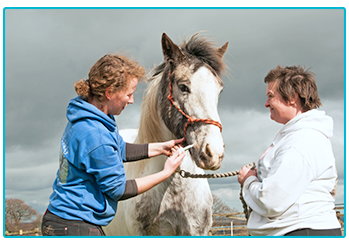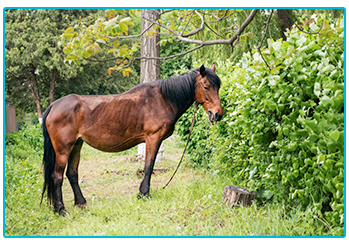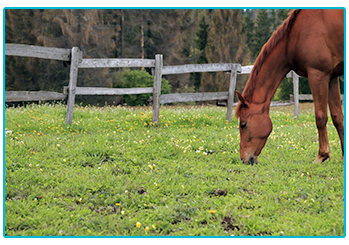Owning a horse can lead to some magical adventures for you and your equine friend, but you’ll want to make sure they stay healthy along the way! If your horse doesn’t have a worming programme, they could be at risk of contracting infections from parasites, such as small redworms, which can be some of the deadliest parasitic worms that affect horses. Fortunately, a new test is in development which will detect all stages of small redworm, or cyathostomin. We’ve spoken to our horse health expert about redworm, treating the infection and the new blood test!

Encysted Small Redworm
Redworm larvae, when ingested by horses, can lay dormant in the gut. You more than likely won’t be able to see any symptoms at this stage, as the encysted larvae can be relatively harmless to your horse, even in large numbers. However, if the parasite is left unattended, the reactivation and migration of the small redworm larvae can interfere with the function of the gut. This can potentially cause severe diarrhoea, weight loss and weakness.

Treatment
A regular worming programme is often the most effective form of treatment for redworm. Since redworm larvae are commonly dormant in the winter months, worming while the weather is cold could help you reduce the threat of serious disease to your horse. Remember to always consult your vet before deciding on any course of treatment.
Routine Egg Counts
You should also include routine faecal egg counts within your worming programme. These can help to ensure that the treatments are effective, avoid over-treatment and minimise the risks of resistance of the worm to treatment. However, faecal egg counts have their limitations, and are unable to detect the presence of tape worm and encysted small red worm within the gastrointestinal tract.

New Blood Test
A new blood test has been announced, launching in early 2020, capable of detecting all stages of small redworm. The test will allow horse owners to work with their vets to help target wormers against small redworm infections. This should help to reduce the unnecessary use of certain wormers, leading to a lower rate of resistance to those medications in the parasites.
Redworm can cause serious problems in horses, but you can minimise the risk with a regular worming routine. If you’re worried about your pony’s health or you’re thinking about changing their worming programme, remember to always consult your vet.
All content provided on this blog is for informational purposes only. We make no representations as to the accuracy or completeness of any information on this site or found by following any link on this site. We will not be liable for any errors or omissions in this information nor for the availability of this information. We will not be liable for any loss, injury or damage arising from the display or use of this information. This policy is subject to change at any time.


